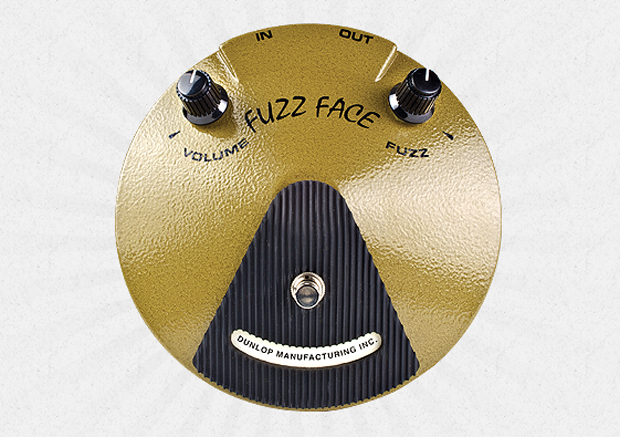Interview: Eric Johnson Discusses His Dunlop Signature Fuzz Face Pedal

Ask any guitarist to describe Eric Johnson in one word, and you'll likely get one response: “Tone."
Johnson took the music world by storm with the release of his 1986 album Tones and the subsequent Ah Via Musicom from 1990. Since that time, he's released a successful DVD, appeared on several G3 and Experience Hendrix tours -- and he's even won a Grammy.
But as amateur guitarists search for an approximation of Johnson’s tone, Johnson has been on his own quest to refine that tone. Dunlop recently released the Eric Johnson Signature Fuzz Face pedal, which was borne out of Johnson's desire to get his signature sound on a consistent basis, regardless of the venue.
We recently caught up with Johnson to discuss his sound, his gear, his current three-piece band and the theory of relativity.
GUITAR WORLD: You're known as the man with the tone. When you're on the road, how hard is it to keep your sound the way you want it, considering the different venues and halls?
It’s interesting; that’s the original reason I fell in the rabbit hole. I would play gigs where my guitar sound was really great and other nights when it was horrible. At the end of the day, it’s an X-factor, a mojo thing, like the wind. You can’t wrestle the wind into being your slave. It is what it is. We have to realize our limitations as humans and go with that universal flow. Then we can become bigger and better. If we try to do it ourselves, you just keep running into brick walls.
I think in the big sense, there is so much you can do to manipulate your sound. Having said that, I just got tired of it being different every night. I thought there had to be a little bit of science to all this. I would try to use the same cords and set it all up the same. Once I got it to where it really sounds great, I needed to make marks and study it so that I can get more consistent. The ongoing process of trying to get a better sound has been a crazy bronco ride, but when it does get right, the chances of it staying consistent are way, way higher than before.
Get The Pick Newsletter
All the latest guitar news, interviews, lessons, reviews, deals and more, direct to your inbox!
Not that long ago, you created a new pedal with Dunlop -- your signature edition Fuzz Face. What can you tell me about it?
The Fuzz Face is a weird pedal. The impedance is strange. It’s very picky about the guitar pickup that goes into it. It’s picky about the front of the amplifier. It’s almost like, "Why deal with it?" But when it is really right, it’s magical.
I’ve never found any fuzz that sounds like it. It’s not an overdrive unit; it’s more of a fuzz saturation. Most saturated fuzz is a kind of a buzzy clacking and doesn’t track that well with a pick. The weird phenomenon is, if you get the right kind of Fuzz Face, with the right pickups and the right amplifier front end, there's a certain thing that happens, and it doesn’t get any better than that. I wanted to chase that down.
A lot of the old '60s fuzzes are not that good. They dry out -- or there's the happenstance of how somebody put something together. Sometimes it's superlative, sometimes it’s no good. It is the nuances of the interactions of the parts. Thinking about the theory of relativity, everything is relative. Everything has a co-dynamic with the thing it’s in association with. That’s true of everything on the planet. If you get one that got put together a certain way, it sounded great. I wanted to try to figure out a way to make ones that sound like a good one from the '60s.
I’ve sold all my original Fuzz Faces except one I don't use. I use the new Fuzz Face. Jeorge Tripps really went far and beyond to capture that '60s sound, which he really did. They are very musical and they track with your pick.

What other effects are you using?
I have a lot of stuff, but it's not all turned on all the time. I used a MXR Digital Delay, a Boss DD-2 and an Echoplex. The Boss DD-2 goes on my Twins for rhythm; the MXR Digital Delay goes on my dirty rhythm Marshall, and the Echoplex goes on my lead. They are never on at the same time. Other than that, it’s a chorus, a tube drive and the Fuzz Face.
Are you touring as a trio this time around?
I am. Chris Maresh is on bass and Wayne Salzmann is on drums. I’ve been playing with them for a couple of years.
Have you ever toured with a second guitarist, or do you prefer a three-piece?
I don’t know if I ever have. I think about it a lot. I’d like to do some other stuff other than a trio. It’d be nice to have more texture and orchestration. I guess I’ve been used to so many years of trio, it’s like a natural reflex. It would be good for me to try some other stuff.
You're going to be doing this run of dates [See link below for dates]. What's after that?
I’ve been offered some really nice concerts in England next year. I’d like to get off the road for a while and regroup and think about what I want to do and what I can do to shift gears in what I’m doing. I’d like to get a new perspective so I don’t just keep doing the same thing. I’d like to approach recording differently in an emotionally deeper way and get some good, spontaneous playing. That would unfold definitely into some touring next year. I’d like to just take some time to write and work on new recordings.
Catch Eric Johnson on tour now, in support of his latest album, 2010's Up Close (Buy it on iTunes). Check out his current tour dates right here. (NOTE: An extra show has been added: September 30 at Altar Bar in Pittsburgh, Pennsylvania.)
“Jimi was staying at a hotel in Times Square. He had his hair set in pink curlers and we would just talk band drama”: Electro-Harmonix founder Mike Matthews on befriending Hendrix, booking Chuck Berry and the birth of pedal culture
“Our answer to everything players have asked for and more”: Neural DSP’s Nano Cortex had one major drawback – but now it’s been addressed with a huge free firmware update that takes on Kemper and TONEX




![[from left] George Harrison with his Gretsch Country Gentleman, Norman Harris of Norman's Rare Guitars holds a gold-top Les Paul, John Fogerty with his legendary 1969 Rickenbacker](https://cdn.mos.cms.futurecdn.net/TuH3nuhn9etqjdn5sy4ntW.jpg)





